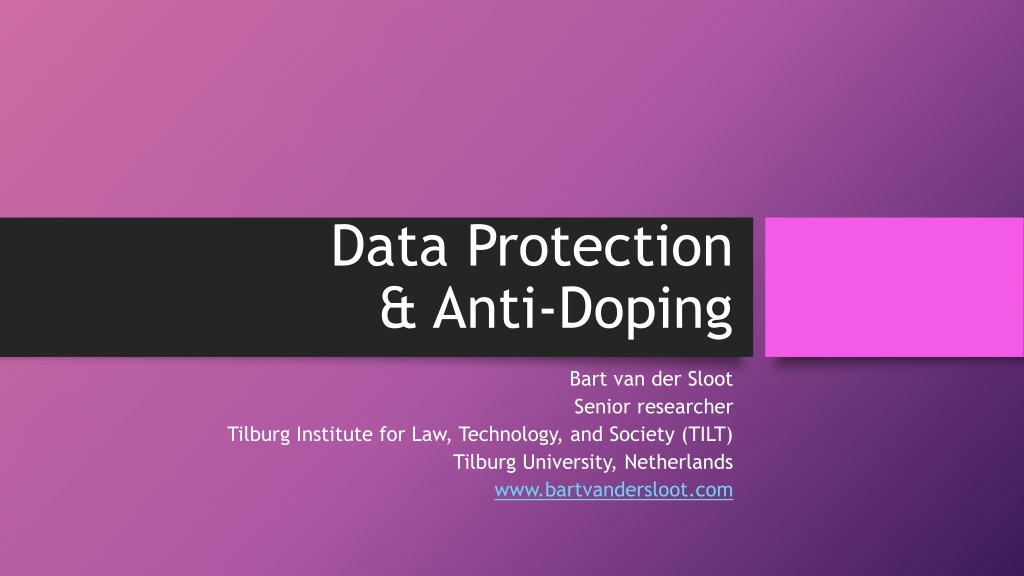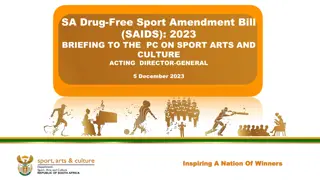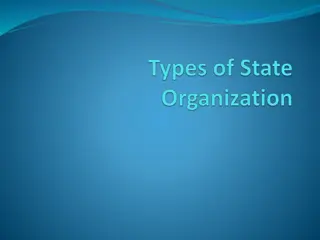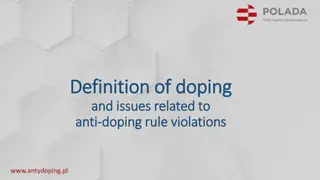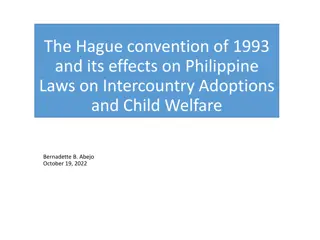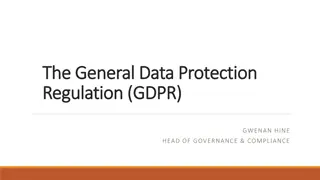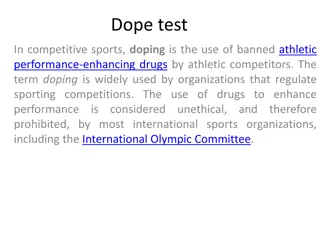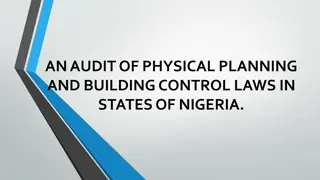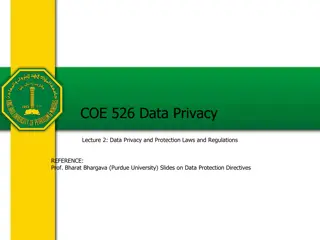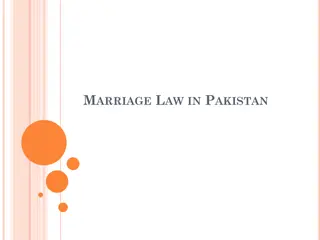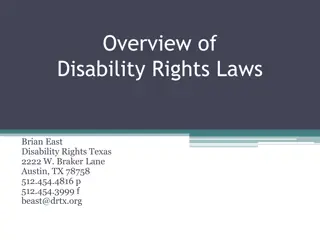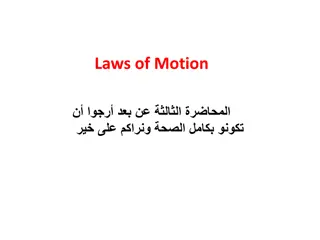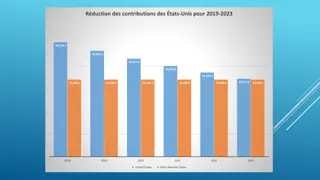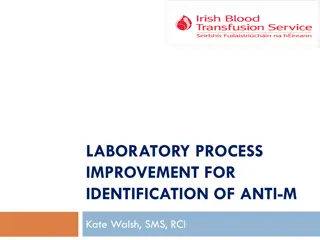Study on Anti-Doping Laws and Data Protection in EU Member States
Senior researcher Bart van der Sloot presents an evaluation of anti-doping laws and practices in EU Member States in the context of the General Data Protection Regulation. The report covers key aspects such as data processing under the WADA framework, comparative analysis of Member States legislation, potential tensions with GDPR, and recommendations for enhancing compliance.
Download Presentation

Please find below an Image/Link to download the presentation.
The content on the website is provided AS IS for your information and personal use only. It may not be sold, licensed, or shared on other websites without obtaining consent from the author. Download presentation by click this link. If you encounter any issues during the download, it is possible that the publisher has removed the file from their server.
E N D
Presentation Transcript
Data Protection & Anti-Doping Bart van der Sloot Senior researcher Tilburg Institute for Law, Technology, and Society (TILT) Tilburg University, Netherlands www.bartvandersloot.com
Topics (1) Overview of report (2) Process (3) Main findings & Recommendations
(1) Overview of the report Anti-Doping & Data Protection: An evaluation of the anti-doping laws and practices in the EU Member States in light of the General Data Protection Regulation https://publications.europa.eu/en/publication-detail/- /publication/50083cbb-b544-11e7-837e- 01aa75ed71a1/language-en/format-PDF/source-44694285
(1) Overview of the report - Ronald Leenes (TILT) - Peter McNally (Spark Legal) - Mara Paun (TILT) - Bart van der Sloot (TILT project leader) - Patricia Ypma (Spark Legal)
(1) Overview of the report External expert group consisting of: - Prof. dr. Jos Dumortier (Time.lex) - Prof. dr. Marjan Olfers (VU University) - Prof. dr. Han Somsen (Tilburg University)
(1) Overview of the report 1. Executive summary 2. Introduction 3. Data processing under the WADA framework 4. Comparative overview of MS legislation 5. Field Study 6. Potential Tensions with the General Data Protection Regulation 7. Recommendations Annex I Template Country Reports Annex II - Fact Sheets Anti-Doping & Data Protection Annex III Survey distributed to all NADOs Annex IV Interview Protocol
(2) Process (1) Literature overiew anti-doping (2) Overview WADA guidelines, codes and standards (3) Description and analysis of the anti-doping structure/rules (4) Description and analysis sent to WADA for validation (5) Finalisation of description and analysis of data processing under the WADA framework (6) Result chapter 3 of the report
(2) Process (1) Template for country reports designed by research team (2) Country reports on anti-doping and data protection by national experts (3) Reviewed by research team (4) Revised by national experts (5) Sent to national NADOs for validation (6) Finalised, resulting in the annex I and II of the report (7) Survey sent to all NADOs for additional information (8) Analysis of the results, see annex III
(2) Process (1) Description and analysis of the results from the country reports and surveys (2) Additional research by research team (3) Draft analysis of EU Member States law (4) Sent to NADOs for validation (5) Revised and finalised, resulting in chapter 4 of the report
(2) Process (1) Selection of countries (2) Design of interview protocol (3) Test interview with NADO (4) Finalisation interview protocol (5) Telephone interviews with NADOs (6) Physical interviews with NADOs (7) Physical interview with International Rugby Federation (8) Physical interview with WADA (9) Telephone interview with Data Protection Authority (10) Interviews with athletes and EU athletes (11) Additional background interviews with experts (12) Interview protocol in Annex IV
(2) Process (1) Description and analysis of the interviews (2) Additional research by research team (3) Draft analysis of the implementation in practice of EU Member States law (4) Sent to NADOs and other inteview partners for validation (5) Revised and finalised, resulting in chapter 5 of the report
(2) Process (1) Overview of literature on privacy and data protection with respect to anti- doping (2) Overview of case law on privacy and data protection with respect to anti-doping (3) Description of privacy and data protection as fundamental/human rights (4) Description of Data Protection Principles in the General Data Protection Principles (5) Description of the recommondations by the Article 29 Working Party from 2008 and 2009 (6) Draft legal evaluation of the results found in chapters 3, 4 and 5 (7) Draft recommendations based on the legal analyis (8) Draft report sent to European Commission and independent experts for suggestions (9) Draft final report sent to external expert group for validation (10) Finalisation of the project
(2) Process The whole process took about 1,5 year Finished in 2016 Additional research continued untill 2018 A book will be published late 2019, with perspectives from privacy, data protection, the right to a fair trial and non-discrimination
(3) Main findings 1. Data gathering 2. Data sharing 3. Data controllership 4. Procedural requirements 5. Transparency 6. Right to information 7. Right to object 8. Right to be forgotten 9. Data retention 10. Proportionality/necessity/subsidiarity
(3) Main findings ARTICLE 8 ECHR - Right to respect for private and family life 1. Everyone has the right to respect for his private and family life, his home and his correspondence. 2. There shall be no interference by a public authority with the exercise of this right except such as is in accordance with the law and is necessary in a democratic society in the interests of national security, public safety or the economic well-being of the country, for the prevention of disorder or crime, for the protection of health or morals, or for the protection of the rights and freedoms of others.
(3) Main findings Article 7 Respect for private and family life Everyone has the right to respect for his or her private and family life, home and communications. Article 8 Protection of personal data 1. Everyone has the right to the protection of personal data concerning him or her. 2. Such data must be processed fairly for specified purposes and on the basis of the consent of the person concerned or some other legitimate basis laid down by law. Everyone has the right of access to data which has been collected concerning him or her, and the right to have it rectified. 3. Compliance with these rules shall be subject to control by an independent authority.
(3) Main findings REGULATION (EU) 2016/679 OF THE EUROPEAN PARLIAMENT AND OF THE COUNCIL of 27 April 2016 on the protection of natural persons with regard to the processing of personal data and on the free movement of such data, and repealing Directive 95/46/EC (General Data Protection Regulation)
(3) Main findings Afbeeldingsresultaat voor eu countries
(3) Main findings (1) Data gathering Large quantities of data are collected. These include, but are not limmited to: Name; gender; adress; whereabouts Medicine use/medical condistions > TUE Blood/urine/breath samples Biological passports are created Investigations/Intelligence gained from open sources, interviews, etc.
(3) Main findings - (1) Data gathering Most of these will qualify as personal data: personal data means any information relating to an identified or identifiable natural person ( data subject ); an identifiable natural person is one who can be identified, directly or indirectly, in particular by reference to an identifier such as a name, an identification number, location data, an online identifier or to one or more factors specific to the physical, physiological, genetic, mental, economic, cultural or social identity of that natural person; And even as sensitive personal data: Processing of personal data revealing racial or ethnic origin, political opinions, religious or philosophical beliefs, or trade union membership, and the processing of genetic data, biometric data for the purpose of uniquely identifying a natural person, data concerning health or data concerning a natural person's sex life or sexual orientation shall be prohibited.
(3) Main findings - (1) Data gathering Processing of sensitive personal data is not allowed unless one of the following grounds applies: 1. explicit consent data subject 2. necessary in light of employment and social security and social protection law 3. vital interests of the data subject 4. by a foundation, association or any other not-for-profit body with a political, philosophical, religious or trade union aim; 5. data which are manifestly made public; 6. legal claims or whenever courts are acting in their judicial capacity; 7. substantial public interest, on the basis of Union or Member State law 8. preventive or occupational medicine, the management of health or social care systems 9. public interest in the area of public health; 10. archiving purposes, scientific or historical research purposes or statistical purposes Processing of personal data is allowed when one of the following grounds applies: 1. Consent data subject 2. Contract data subject 3. Legal obligation 4. Vital interest of data subject 5. Public interest 6. Interests of the data controller outweighs that of data subject
(3) Main findings - (1) Data gathering What we saw is that many anti-doping organisations rely on consent. However, this will presumably not provide a solid basis. Consent needs to be: Informed Free Specific Unambious consent is given in the context of a written declaration which also concerns other matters, the request should be clearly distinguishable from other matters The data subject shall have the right to withdraw his or her consent at any time the controller shall be able to demonstrate that the data subject has consented to processing of his or her personal data
(3) Main findings - (1) Data gathering The most viable variant would be having a legal basis in which it is specified what the public interest is that is pursued, which personal data need to be processed for that pursuit and why > Nado = public authority Still, a concern is that the anti-doping rules as such are adopted by a private law foundation this is not unpressedented, but account should be given of the question why the government should use its legislative and/or executive power to enforce the rules of a foreign private law organisation. An additional concern could be that governments would be required to substantiate why and to what extent the various anti-doping measures are indeed in the public interest Finally, in principle, gathering sensitive data is probihited. In the past, the WP29 has questioned the necessity of collecting such data in the anti-doping context
(3) Main findings (2) Data sharing Nado Rado IF Adams/ot her systems Labs MEO Doctor ts WADA Law enforc ement /Const ums
(3) Main findings - (2) Data gathering Article 3 Territorial scope 1.This Regulation applies to the processing of personal data in the context of the activities of an establishment of a controller or a processor in the Union, regardless of whether the processing takes place in the Union or not. 2.This Regulation applies to the processing of personal data of data subjects who are in the Union by a controller or processor not established in the Union, where the processing activities are related to: (a) the offering of goods or services, irrespective of whether a payment of the data subject is required, to such data subjects in the Union; or (b) the monitoring of their behaviour as far as their behaviour takes place within the Union. 3.This Regulation applies to the processing of personal data by a controller not established in the Union, but in a place where Member State law applies by virtue of public international law.
(3) Main findings - (2) Data gathering Cross border data sharing (including onward transfers) is allowed: 1. Within the EU 2. With countries of the EEA 3. Adequacy decision (Andorra, Argentina, Canada (commercial organisations), Faroe Islands, Guernsey, Israel, Isle of Man, Japan, Jersey, New Zealand, Switzerland, Uruguay and the United States of America (limited to the Privacy Shield framework)) 4. Appropriate safeguards 5. Exceptions for incidental transfers (consent, contract, etc.)
(3) Main findings - (2) Data gathering Not all ado s were aware of these rules They used various protocols WADA and the sports/anti-doping community could draft an international standard data sharing protocol, which it would send to the European Data Protection Board for approval This would mean that all ado s and sport organisations would have to comply with (quasi)-GDPR standards
(3) Main findings - (3) Data Controllership Previous discussion already showed how many parties are involved Article 4 Definitions (7) controller means the natural or legal person, public authority, agency or other body which, alone or jointly with others, determines the purposes and means of the processing of personal data; where the purposes and means of such processing are determined by Union or Member State law, the controller or the specific criteria for its nomination may be provided for by Union or Member State law; (8) processor means a natural or legal person, public authority, agency or other body which processes personal data on behalf of the controller;
(3) Main findings - (3) Data Controllership This makes it difficult for the athlete/data subject to know who is responsible for the processing of his/her data Controllers in the EU, such as national anti-doping organizations (NADOs), ((inter-)national) sports federations and Olympic Committees, can deduct from this opinion some of the legal boundaries that exist for processing athletes (and other data subjects ) personal data. The Working Party emphasizes that controllers in the EU are responsible for processing personal data in compliance with domestic law and must therefore disregard the World Anti-Doping Code and International Standards insofar as they contradict domestic law. The Working Party recommends that these controllers seek legal advice in order to be fully aware of all relevant issues, especially the applicability of national laws. Article 29 Working Party, Second opinion 4/2009 on the World Anti-Doping Agency (WADA). Member States are advised to ensure that the law indicates one primary data controller, for example the NADO.
(3) Main findings (4) Procedural requirements Article 30 Records of processing activities 1.Each controller and, where applicable, the controller's representative, shall maintain a record of processing activities under its responsibility. Article 35 Data protection impact assessment 1.Where a type of processing in particular using new technologies, and taking into account the nature, scope, context and purposes of the processing, is likely to result in a high risk to the rights and freedoms of natural persons, the controller shall, prior to the processing, carry out an assessment of the impact of the envisaged processing operations on the protection of personal data. A single assessment may address a set of similar processing operations that present similar high risks. Article 37 Designation of the data protection officer 1.The controller and the processor shall designate a data protection officer in any case where: (a) the processing is carried out by a public authority or body, except for courts acting in their judicial capacity; (b) the core activities of the controller or the processor consist of processing operations which, by virtue of their nature, their scope and/or their purposes, require regular and systematic monitoring of data subjects on a large scale; or (c) the core activities of the controller or the processor consist of processing on a large scale of special categories of data pursuant to Article 9 and personal data relating to criminal convictions and offences referred to in Article 10.
(3) Main findings - (5) Transparency There are about 200 documents from the WADA comprising together about 4.000 pages. Only 6 of those, the Code and the five international standards, are compulsory for anti-doping organisations (ADOs) to take into account, but other instruments, such as the technical documents and the different guidelines for testing, are so detailed and require so much expertise, that in practice, they are almost always followed. The level of detail in the WADA rules means a number of things. For example, the level of detail and the large number of documents means that it will normally be very difficult for a layman, such as the average athlete.
(3) Main findings - (5) Transparency Article 12 Transparent information, communication and modalities for the exercise of the rights of the data subject 1.The controller shall take appropriate measures to provide any information referred to in Articles 13 and 14 and any communication under Articles 15 to 22 and 34 relating to processing to the data subject in a concise, transparent, intelligible and easily accessible form, using clear and plain language, in particular for any information addressed specifically to a child. The information shall be provided in writing, or by other means, including, where appropriate, by electronic means. When requested by the data subject, the information may be provided orally, provided that the identity of the data subject is proven by other means.
(3) Main findings - (5) Transparency It should be ensured in practice that athletes are provided with infor-mation about the data processed about them in a concise, transparent, intelligible and easily accessible form, using clear and plain language, as required by the GDPR. National DPAs may wish to investigate whether relevant provisions on transparency are being respected.
(3) Main findings - (6) Right to information In practice, rather limited information is provided as to why an athlete is included in the registered testing pool, subjected to whereabouts requirements, to a biological passport or why he/she is tested in particular circumstances. In addition, when intelligence is gathered through open sources, the athlete is not informed of this fact, not even when the athlete was not considered to have violated that anti-doping rules on the basis of the intelligence gathered.
(3) Main findings - (6) Right to information Article 13 Information to be provided where personal data are collected from the data subject 1.Where personal data relating to a data subject are collected from the data subject, the controller shall, at the time when personal data are obtained, provide the data subject with all of the following information: (a) the identity and the contact details of the controller and, where applicable, of the controller's representative; (b) the contact details of the data protection officer, where applicable; (c) the purposes of the processing for which the personal data are intended as well as the legal basis for the processing; (d) where the processing is based on point (f) of Article 6(1), the legitimate interests pursued by the controller or by a third party; (e) the recipients or categories of recipients of the personal data, if any; (f) where applicable, the fact that the controller intends to transfer personal data to a third country or international organisation and the existence or absence of an adequacy decision by the Commission, or in the case of transfers referred to in Article 46 or 47, or the second subparagraph of Article 49(1), reference to the appropriate or suitable safeguards and the means by which to obtain a copy of them or where they have been made available. 2.In addition to the information referred to in paragraph 1, the controller shall, at the time when personal data are obtained, provide the data subject with the following further information necessary to ensure fair and transparent processing: (a) the period for which the personal data will be stored, or if that is not possible, the criteria used to determine that period; (b) the existence of the right to request from the controller access to and rectification or erasure of personal data or restriction of processing concerning the data subject or to object to processing as well as the right to data portability; (c) where the processing is based on point (a) of Article 6(1) or point (a) of Article 9(2), the existence of the right to withdraw consent at any time, without affecting the lawfulness of processing based on consent before its withdrawal; (d) the right to lodge a complaint with a supervisory authority; (e) whether the provision of personal data is a statutory or contractual requirement, or a requirement necessary to enter into a contract, as well as whether the data subject is obliged to provide the personal data and of the possible consequences of failure to provide such data; (f) the existence of automated decision-making, including profiling, referred to in Article 22(1) and (4) and, at least in those cases, meaningful information about the logic involved, as well as the significance and the envisaged consequences of such processing for the data subject.
(3) Main findings - (6) Right to information It should be ensured in practice that data controllers in the anti- doping context inform athletes in a detailed manner about when personal data are gathered about them, why, by which means and to whom they are disclosed, as required by the GDPR. National DPAs may wish to investigate whether relevant provisions on providing information are being respected.
(3) Main findings - (7) Right to object WADA restricts the rights of athletes to object to the processing of their personal data. On a number of points, WADA s regulations addressed at athletes specify explicitly that the athlete s objection will over overruled, such as: You understand that if you object to the processing of your data, it still may be necessary for your Custodian Organization and WADA to continue to process (including retain) certain of your data to fulfil obligations and responsibilities arising under the Code. You understand that objecting to the pro-cessing, including disclosure, of your data may prevent you, your Custodian Organiza-tion, WADA or other ADOs from complying with the Code and relevant WADA Interna-tional Standards, in which case such objection could constitute an anti-doping violation. On other points, objection to provide data may lead to sanctions.
(3) Main findings - (7) Right to object Article 21 Right to object 1.The data subject shall have the right to object, on grounds relating to his or her particular situation, at any time to processing of personal data concerning him or her which is based on point (e) or (f) of Article 6(1), including profiling based on those provisions. The controller shall no longer process the personal data unless the controller demonstrates compelling legitimate grounds for the processing which override the interests, rights and freedoms of the data subject or for the establishment, exercise or defence of legal claims.
(3) Main findings - (7) Right to object Member States are advised to ensure that data controllers in the anti-doping context do not automatically overrule the athlete s right to object nor automatically attach negative consequences to objects of athletes.
(3) Main findings - (8) Right to be forgotten The publications by ADOs of the anti-doping rule violations, the sanction and the identity of the athlete, which is currently mandated by WADA, with the exception to minors, may conflict with the principles of necessity and proportionality, the data minimi-sation principle and rights of athletes, such as the right to be forgotten . This is especial-ly the case where publication is done through open channels, such as the internet. An alternative may be creating a central database (with restricted access), which is not in-dexed by search engines, thus promoting access to such data on a 'need to know' basis, rather than through 'serendipitous' finds.
(3) Main findings - (9) Storage limmitation The Working Party questions the relevance and necessity of these retention periods. As to the whereabouts information, the Working Party does not consider that there is a valid reason to retain this information after the date relating to particular whereabouts information has passed. As a matter of fact, article 14.3 of the Code itself provides the following rule for the retention of whereabouts information: This information shall be used exclusively for purposes of planning, coordinating or conducting testing; and shall be destroyed after it is no longer relevant for these purposes . Whereabouts information could only be retained longer if the anti-doping organization considers there is an alleged whereabouts filing failure and/or missed test. In such case, a retention of 18 months is justified, as three alleged whereabouts failures amount to an alleged anti-doping rule violation. Once, however, it is determined that there has not been an anti-doping rule violation, the whereabouts information should be deleted. The Working Party therefore urges WADA to change its policy on the retention of whereabouts information in light of the above. Ibid, p 15.
(3) Main findings - (9) Storage limmitation Under the 2015 rules, the data retention terms have been further extended. Although, in the latest 2018 rules the data retention terms have not been further extended, it can be argued, based on the analysis of the principle of data retention in the GDPR, that the current terms may be unjustifiably long. The only restraints to the data retention periods appear to be the principles of necessity and proportionality. Many data protection authorities in Europe have been critical on the point of the retention dates, finding that they are excessive and do not differentiate enough between different types of data and reasons for retaining them. Consequently, it seems that on this point, the current anti-doping framework is not in conformity with the GDPR. In order to be GDPR-compliant, the retention terms should be more limited and should be more granular, specifying why, which data and under which conditions should data be stored for a certain period.
(3) Main findings - (10) Proportionality/necessity/subsidiarity
Testing authority Because of the wide defintion of athletes and ASP and because many amateur athletes fall under the anti-doping regime as well, the testing authority claimed by NADOs can be as high as 1/4 or even 1/3 of the popula-tion of a country. This means that it is at the discretion of the NADO how to use its pow-ers and to decide who to subject to tests. ADOs determine a test distribution plan through which they limit their testing to a limited number of athletes. Still, they are au- thorised to diverge from the test plan when they believe that to be necessary. WADA explicitly states that an athlete may not refuse to submit to sample collection on the ba-sis that such testing is not provided for in the ADO's Test Distribution Plan or that the athlete does not meet the relevant selection criteria for testing or otherwise should not have been selected for testing. This means that ADOs can subject any athlete under its presumed testing authority to tests when they believe this to be necessary, without hav-ing an obligation to justify such decision either to an athlete, before a judge or to another organization.
Whereabouts/OOC-testing Athletes under whereabouts require-ments are required to indicate per day where they are and where they sleep. If they are not at the indicated place at the indicated time, this is considered an error, three of which in a year will lead to an Anti-Doping Rule Violation. All athletes, not only those having to provide their whereabouts, may be tested out-of-competition, meaning at home, when training or on vacation, 24/7. These are far reaching limitations on the right to privacy and data protection of athletes. WADA leaves room for ADOs to determine the scope and application of such requirements.
Biological passport A biological passport is made of a limited number of athletes, through which their blood or urinal profile is monitored and profiled longitudinally. Again, this is a signif-icant limitation of the athlete s right to privacy and data protection. At the same time, such biological passports seldom lead to Adverse Analytical Findings; rather, they are used to signal red flags (biological passports do reveal Atypical Findings) to investigate suspicious results further. WADA leaves room for ADOs to determine the scope and appli-cation of such requirements.
Blood/urine testing The samples taken from athletes concern mostly either their blood or their urine. Both methods can be seen as limiting athletes' privacy, in particular the bodily integrity of athletes to a large extent. In order to extract blood, the athlete s body is entered with a needle, which is an intrusion on their bodily integrity. With respect to urine, the Doping Control Officer has direct sight of the genitalia of the athlete, which again is an intrusion of their privacy. No evidence was found during this study on whether and to what extent alternative tissues, such as hair of saliva, the gathering of which is far less intrusive, can provide reasonable alternatives. WADA has indicated that it is investigating such options and Member States are advised to do so as well.
